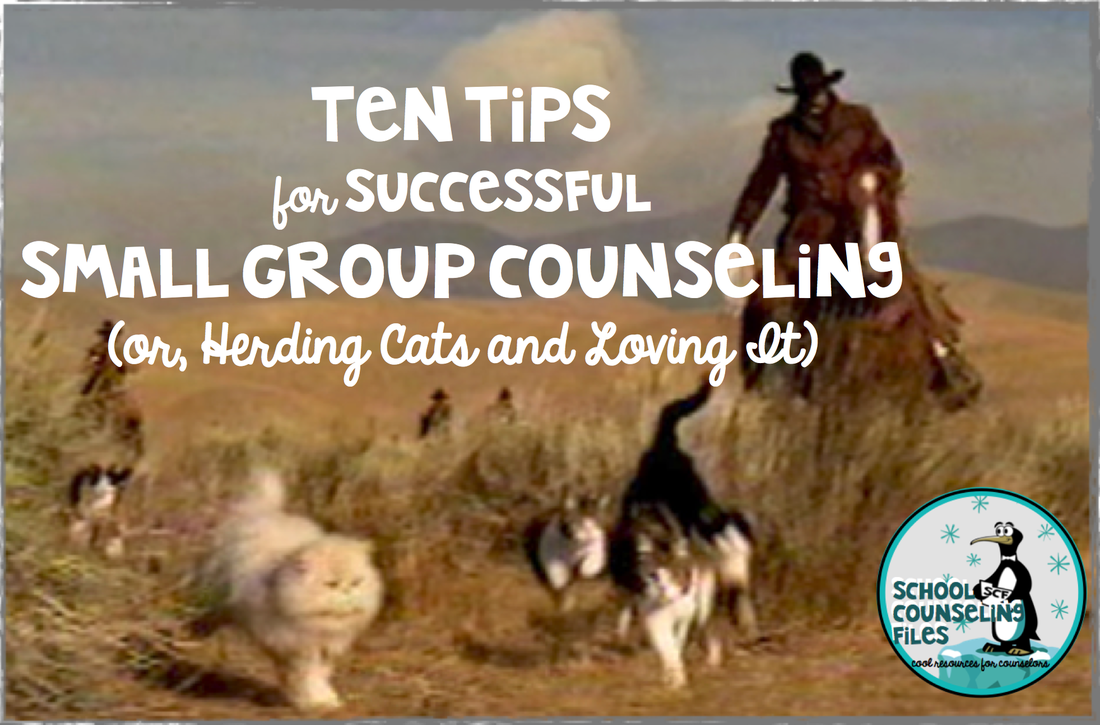|
While a lot of school counselors are intimidated by the idea of running small groups, I LOVE them. Group services are the most effective use of my time, and kids are always relieved and happy to find that other students have many of the same struggles. I fill most of the direct service slots on my schedule with small groups. In my 25 years in a school setting, I’ve learned a lot about what works (and even more about what doesn’t). Here are my top ten tips for setting up and running your counseling groups. 1. Group students by issue. Twenty-five years ago, all my groups were simply called “social skills” (translation: we’d play games and practice good sportsmanship). For ease of scheduling, I grouped kids according to their homeroom or grade. Now that I’m actually trying to teach a range of social-emotional skills, I group kids by what they need to work on. My most common groups are: emotional regulation, anxiety management, Social Thinking©, and “social superheroes.” Once I determine who needs which type of group, I try to combine personalities that will work well together. 2. Consider co-ed or multi-grade groups. They provide opportunities for interaction between kids who wouldn’t normally spend time together. This is almost always a good thing. 3. Create your overall group plan before the first session. This isn’t hard if you’re using a purchased curriculum. If you’re more of the “spontaneous” type who likes to wing it from one week to the next, make sure you take notes so the next time you run this kind of group you already have a head start. The one thing you don’t want is to be running around 10 minutes before you pick up the kids, going, “Crap, what are we going to do today?” Disorganization is the enemy of a successful session! 4. Limit the group to 6, 8, or 10 weeks instead of having it last the whole school year. It forces you to be more deliberate with your limited time together, and a rotating schedule gives you a chance to service more children in a small-group setting. You can always roll high-needs kids over into the next round of groups. 5. Try to avoid lunch groups, unless they are purely social or a way for you to establish relationships with particular students. You cannot teach skills like emotional regulation, or do writing or craft activities with kids who are trying to eat their lunch. 6. Include role model students. Plural. If your group is four or more (and I never have more than 6 in a group; four is my preferred number), I include at least two role models. If it’s a group targeting students on the Autism spectrum, I include more. Listen to the voice of experience here: everyone, including you—especially you—will enjoy themselves much more if the entire group doesn’t sink to the lowest common denominator. 
make action GIFs like this at MakeaGif
These last four should be self-evident, but I’ll lay them out anyway:
7. Make sure you obtain signed permission for every student you plan on taking. If you’re recruiting a child as a role model, write it on the permission slip (as well as how long the group lasts, when it will meet, etc.). Parents are always flattered that their child is considered a role model for others; I’ve never had one deny permission. I also ask for permission to photograph and video students. 8. Set up some quick and easy way of communicating to teachers and parents what you did each week and how each student did. That way they can reinforce concepts outside of the group setting. Keep a copy for yourself too. Because data. 9. In your first session, let students know that sometimes you might have to miss a group because of a meeting or an emergency. I always assure them that I will never “forget” to pick them up, that I’ll try and let their teachers know beforehand if I’m going to miss or be late, and that I’ll add another week on the end so they will still get their allotted number of sessions. 10. HAVE FUN! I can’t stress enough how important this is. If you’re excited about the day’s activity and think it’s fun and interesting, the kids will too. Engaged children are happy and cooperative children who will devour everything you try to teach them and clamor for more. Did I miss anything? What is your top tip for successful small groups?
15 Comments
|
Author
|


 RSS Feed
RSS Feed